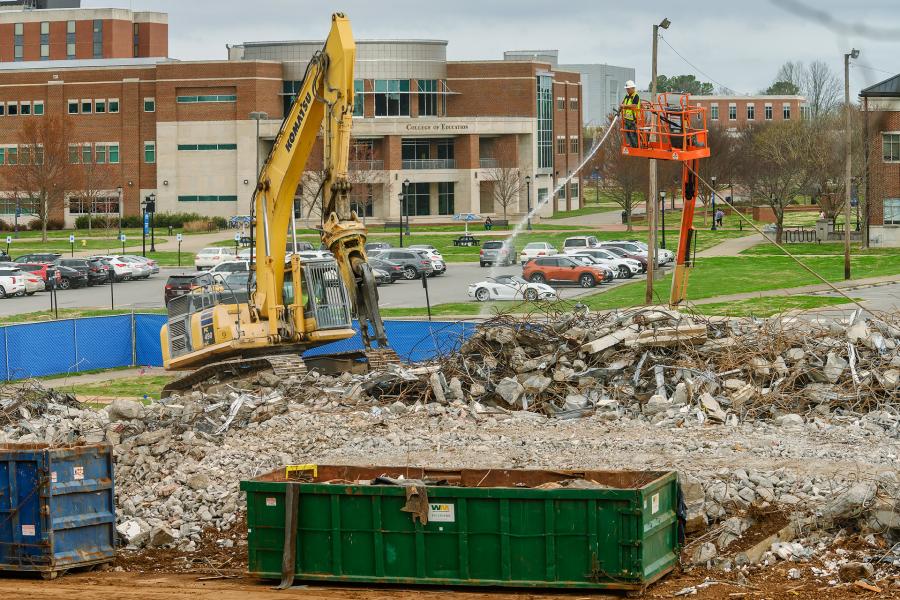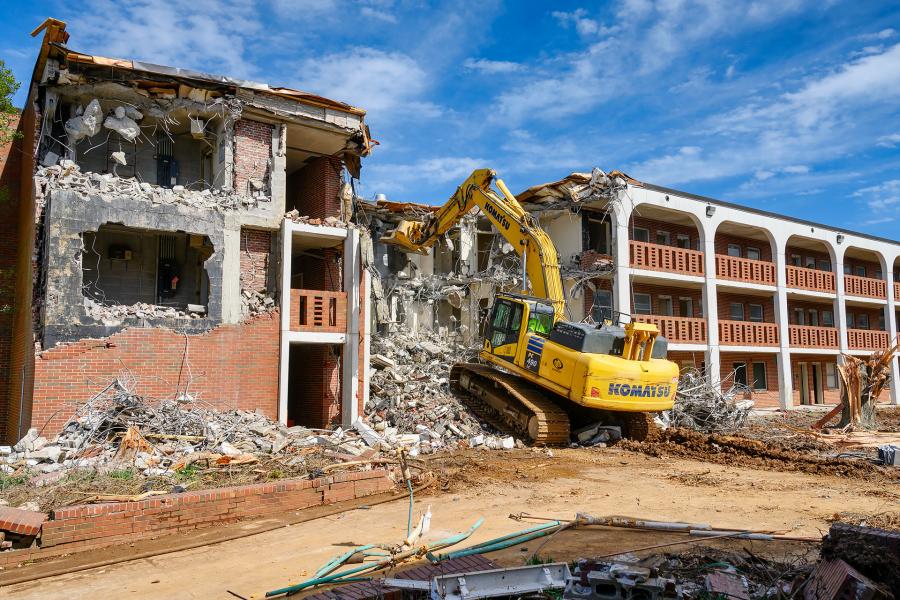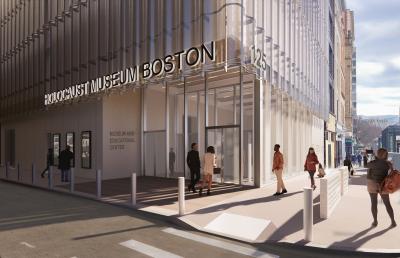Two buildings — the Abernathy and Ezell halls — were razed to make way for the School of Concrete and Construction Management.
Students starting classes in the fall of 2022 at the Middle Tennessee State University's (MTSU) School of Concrete and Construction Management (SCCM) won't be just studying in a new $40 million building — they'll be learning the business in a showcase.
The 54,000-sq.-ft. facility features bare structural elements to give students the hands-on experience MTSU prides itself on.
"We wanted to make sure that the building was not just a place to house education, but a living, learning environment," said Kelly Strong, SCCM director and professor. "We have intentionally left the concrete, steel, timber and masonry exposed in places so the students can see them. We worked with the architect and builder to make sure the structural elements are architecturally appropriate. They really weave together. It's a gorgeous looking building. The intention was to be a showcase to show how aesthetic it can be if done right. When high-quality trade workers are involved, you can expose structure and it can be beautiful in itself. There's no need to cover it up."
Concrete in numerous forms plays a big role in the design, including dyed, etched, board-formed and precast. Strong suspects the unaware may not recognize it's concrete.
"It's got a lot of different concrete elements to try to break people's assumptions about concrete," Strong said. "There is a wide range of applications you can do with concrete to make it do what you want it to do, so we are showcasing that in this building."
For project manager Ross Gray of Hoar Construction, the building is a one-of-a-kind opportunity, demanding a close eye to detail and emphasis on coordination.
"This is a very unique building," Gray said. "I've never built anything like this before. Typically we're dealing with concrete and/or steel or concrete footings or steel structures. On this, we've got concrete, CMU block, structural steel and a whole new dynamic to me as a contractor, hollow core plank. You're adding more coordination between more trade partners and how they all align with each other at the end of the day."
The exposed structural elements also are new to Gray, who is more accustomed to clients wanting imperfections covered. On this project, when a finish is questionable, Gray contacts the architect and school staff members to take a look to see if it should be corrected.
"I think showing students how these components come together as a hands-on, visible tool is remarkable," Gray said. "I see a great value in how it gets pieced together and you build a building. With how they are using these labs, having that hands-on for the students is a great value in my opinion."
Two buildings — the Abernathy and Ezell halls — were razed to make way for the SCCM, which offers not only the up-close construction experience, but the most current technology available. That was a big reason for the innovative learning facility.
"The construction industry has changed so dramatically with the advent of digital drawings, documentation, software for cost control and building modeling," Strong said. "We can look at buildings in 3D on the computer screen, look for clues, things that aren't going to fit, things you normally wouldn't have discovered pre-digital innovation until the construction phase."
But that requires high-tech computers and all the infrastructure needed to operate them. Former SCCM classrooms could not have been upgraded to accommodate the new technology at a reasonable cost. The new building will feature three labs with "high-powered" workstations so students can do the same modeling they'll do on the job.

"You can now take a set of 3D building plans and, for example, take each building element, such as a door, and assign a cost and installation date to it," Strong said. "When the door comes in you can check it against the estimated cost and date of installation. Pre-digital, you had a set of blueprints, then you had to find the estimate and then you had to find the schedule to find out when it would be installed. Now you can add or layer the model with however much information you want and, if you are properly trained, which our students are, you can pull out just the cost data, or just the doors, or the information you need and it makes cost control and schedule control and communication with owners and suppliers so much more seamless."
Strong noted the concrete industry's "generous" donations played a significant role in making the project reality. The SCCM — described by MTSU as one of the "most exclusive in the nation" — offers 325 majors and boasts an alumni of 1,500.
"We could probably double 325 and place every one of them. Our students are in such demand. We had 45 graduates and 90 companies come to campus to recruit. The average starting salary is $60,000. Our graduates are instantly middle class." CEG
Lori Tobias
Lori Tobias is a journalist of more years than she cares to count, most recently as a staff writer for The Oregonian and previously as a columnist and features writer for the Rocky Mountain News. She is the author of the memoir, Storm Beat - A Journalist Reports from the Oregon Coast, and the novel Wander, winner of the Nancy Pearl Literary Award in 2017. She has freelanced for numerous publications, including The New York Times, The Denver Post, Alaska Airlines in-flight, Natural Home, Spotlight Germany, Vegetarian Times and the Miami Herald. She is an avid reader, enjoys kayaking, traveling and exploring the Oregon Coast where she lives with her husband Chan and rescue pups, Gus and Lily.
Read more from Lori Tobias here.
Today's top stories
















